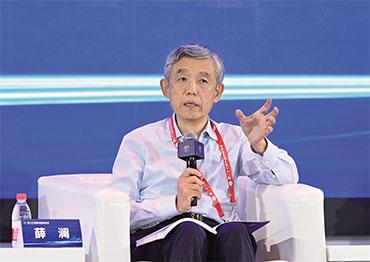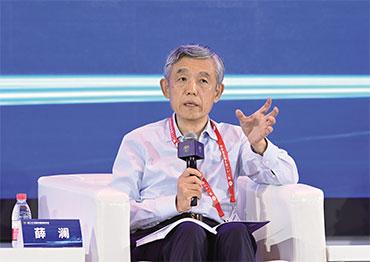n March 10, an institutional reform plan issued by China’s State Council, the country’s cabinet, was approved by the first session of the 14th National People’s Congress, the top legislature, in Beijing. The reshuffle comes five years after a previous institutional reform cut the number of ministerial-level bodies by eight and vice-ministerial-level entities by seven.
According to the new plan, a national financial regulatory administration is to be set up based on the current China Banking and Insurance Regulatory Commission, and it will become a government agency directly under the State Council. It is responsible for the supervision of the financial industry, securities excluded, and it will take over some of the current responsibilities of the People’s Bank of China and the China Securities Regulatory Commission (CSRC). The CSRC will become a government agency directly under the State Council and take over the review and approval of corporate bond issues which is currently the responsibility of the National Development and Reform Commission (NDRC).
The plan includes deepening reform of financial regulatory systems and branches of the People’s Bank of China, the central bank, and improving the management system of State-owned financial capital. For example, county-level branches of the central bank will be closed.
Another major change is the reorganization of the Ministry of Science and Technology (MST) and the formation of the Central Science and Technology Commission. The restructured MST will serve as the working body of the new commission. Xiao Jie, State councilor and secretary-general of the State Council, explained that scientific and technological innovation plays a central role in China’s overall modernization process. Given the fierce international competition in science and technology and external containment and suppression, the leadership and management system of science and technology should be further straightened out to overcome difficulties in core technologies, and accelerate the realization of self-reliance and self-improvement in the sector.
A proposed National Data Bureau, to be administered by the NDRC, will be created to advance the development of data-related fundamental institutions and push forward the planning and building of a Digital China, the digital economy and a digital society. Another highlighted change is to downsize staffing levels at central state institutions by 5 percent. Those positions will be given to fields which will be prioritized, though the plan does not specify what fields these are.
At a consultative meeting with non-Communist political parties held in Beijing on February 28, 2023, Chinese President and General Secretary of the Communist Party of China Central Committee Xi Jinping said that in general, the reform of Party and State institutions this time, highlighting key industries and fields, is more targeted and intensified, covering many areas and involving a wide range of interests. It focuses on resolving challenging issues that are of great significance and of great concern to society, which will have an important impact on economic and social development, he noted.
In an interview with NewsChina, Professor Xue Lan, an academic committee member of the School of Public Administration at Tsinghua University and Dean of Schwarzman College shared his views on the reform.
NewsChina: What do you think of the new institutional reform plan?
Xue Lan: This round of institutional reform can be seen as a continuation and deepening of the reform of Party and State institutions that took place in 2018. Compared to the previous institutional reshuffle, this reform has not established new or eliminated departments of the State Council. Instead, under the existing structure, efforts are focused on sorting out and optimizing the internal functions of the current departments, with the most typical change, for example, taking place in the reorganization of the Ministry of Science and Technology. To cope with some new challenges, such as negative population growth, the Ministry of Civil Affairs will organize, formulate and coordinate the implementation of policies and measures to address the issue of aging population. In order to improve and streamline the senior care mechanism, the specific work of the National Working Committee on Aging was transferred to the Ministry of Civil Affairs from the National Health Commission. In this way, issues connected to the aging society will not be addressed in a fragmented institutional structure.
Strengthening financial supervision is also an important change in this reform. In recent years, financial risks have been the focus of the State, and the State has been strengthening strict supervision of the financial field. In 2017, the State Council established the Financial Stability and Development Committee, and in 2018, the China Banking Regulatory Commission and China Insurance Regulatory Commission merged to make the China Banking and Issuance Regulatory Commission. On this basis, the National Financial Regulatory Administration will be set up as an institution directly under The State Council. To strengthen supervision, the National Financial Regulatory Administration will include the People’s Bank of China’s daily supervision responsibilities of financial holding companies and other financial groups.
In fact, the focus of a country’s government functions shifts according to different stages of development. In previous years, many Chinese government agencies focused on promoting development, but there were not many regulatory government agencies, which was closely related to the demand to promote economic and social development at that time. After a certain stage of development, the requirements for regulatory functions will be strengthened, leading to the establishment of the State Administration for Market Regulation, and the State Medical Products Administration for the purpose of meeting the needs of regulatory government functions. By the same token, the newly established National Financial Regulatory Administration is set to strengthen regulation of the finance industry.
NC: How do you understand the newly assigned function of the Ministryof Science and Technology?
XL: The restructured ministry will play two major roles. One focuses on macro level management, which includes further strengthening the guidance of sci-tech strategic planning, reinforcing the development of a new national system for mobilizing research resources and promoting the functions of institutional reform, resource coordination, supervision and management. The other focuses on median level management, which includes the reassignment of the technology management functions back to their respective industry sectors.
For example, the Ministry of Science and Technology will hand back the responsibility of guiding agricultural science and technology to the Ministry of Agriculture and Rural Affairs, the work of ecological science and technology to the Ministry of Ecology and Environment, and high-tech development, industrial planning and the construction of sci-tech parks to the Ministry of Industry and Information Technology. In addition, the Ministry of Science and Technology’s task of bringing in professionals from overseas will be reassigned to the Ministry of Human Resources and Social Security, which will also adopt the functions of the State Administration of Foreign Expert Affairs.
In fact, many years ago, the sci-tech management functions of these industries were originally assigned to the related ministries. But as the function of the Ministry of Science and Technology expanded in recent years, these functions were incorporated into the planning and management scope of the Ministry of Science and Technology. Therefore, this adjustment is kind of a return to the old system. After the adjustment, the functions of the Ministry of Science and Technology are more centralized, and it can play a greater role at the macro-management level.
Of course, it is a big change for the Ministry of Science and Technology itself, because the science and technology management functions shifting to other ministries will involve a large number of personnel changes, as well as the shift of related projects and funds in various fields to other departments.
In addition, the National Natural Science Foundation of China (NSFC) is still managed by the Ministry of Science and Technology, which means the management authority for basic sci-tech research is unchanged and will remain under the MST. The Ministry of Science and Technology also retains management of national laboratory construction and major national sci-tech project management. In other words, basic research, sci-tech infrastructure and major sci-tech projects still remain under the management of the Ministry of Science and Technology, a way to gather national resources and concentrate efforts into solving technology “bottleneck” issues.
NC: What is your view on the new National Data Bureau?
XL: All these adjustments, including the restructuring of the Ministry of Science and Technology, the establishment of the National Data Bureau, and elevating the status of the National Intellectual Property Administration (to an institution directly under the State Council from a department under the State Administration for Market Regulation), have been made against the background of the major opportunities of the new scientific and technological revolution and the intensified geopolitical and external challenges. These measures are to improve the whole country’s scientific and technological innovation strength, and to serve the national positioning of attaining “sci-tech independence.”
The establishment of the National Data Bureau is to promote the development of the digital economy, and to give the role of data full play in the economy. The Cyberspace Administration of China (CAC) used to shoulder the function of study and formulate a Digital China construction plan and coordinate and promote the construction of smart cities. However, on the one hand, it should assume the responsibility of ensuring network security and data security, and on the other hand, it should promote the development of the digital economy, which are two separate issues. After the reform, the responsibility of the CAC becomes more clarified, that is, network security and data security supervision. Then the national data administration can focus more on allowing data to play a fundamental role in the economy to promote the vigorous development of the digital economy.

 Old Version
Old Version
